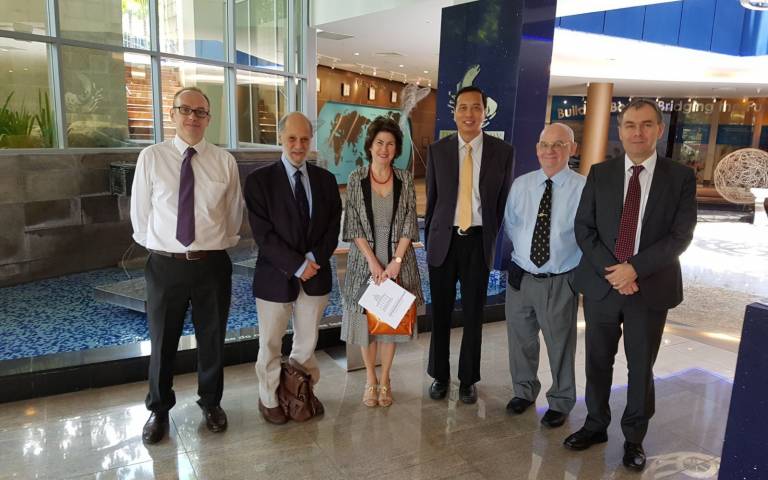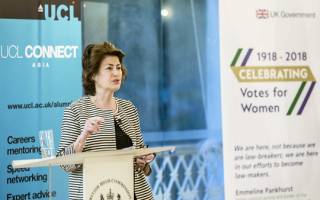UCL Singapore visit strengthens links with NUS and A*STAR
9 April 2018
A UCL delegation visited numerous leading institutions in Singapore last month to build on existing research collaborations

UCL built on its longstanding collaborations in areas including neurodegeneration and artificial intelligence with leading Singaporean institutions on an academic-led visit last month.
UCL professors Nick Phelps, Pro-Vice-Provost for South East Asia and Australasia, and Claudio Stern, Vice-Dean (International) for Medical Sciences, were joined by Vice-Provost International Dame Nicola Brewer at the National University of Singapore (NUS) and the Agency for Science, Technology and Research (A*STAR).
As well as the chance to strengthen links with Singaporean partners, the successful trip also encompassed hosting a joint alumni event with the British High Commission and attending the 2018 Asia-Pacific Association for International Education (APAIE) conference.
Longstanding collaboration
In addition to recruiting more Singaporean students than any other university in the UK, UCL has a longstanding history of research collaboration with Singapore.
Its most frequent collaborator is NUS, with which it shares multiple areas of research. In July 2017, for instance, NUS and UCL signed a Memorandum of Understanding (MoU) to foster research collaboration in data science.
Building on these links, the UCL delegation was hosted by NUS Vice President (University and Global Relations) Professor Andrew Wee, Professor Barry Halliwell, Senior Advisor to the President, along with Professor Phillip Li-Fan Liu, Vice President (Research and Technology) at the university's Singapore campus.
Of the visit, Claudio said: “From urban sustainability to ageing and neurodegeneration, there are a number of common themes to the research being undertaken at UCL and NUS, and we look forward to further interdisciplinary collaboration to address these issues.”
Other shared research areas for the two institutions include cybersecurity, artificial intelligence and the changing climate.
Reciprocal visits
The delegation also visited the A*STAR Graduate Academy (AGA), another of UCL’s long-time collaborators, to discuss current partnerships and forging the way for more cross-disciplinary work.
Among the existing collaborations is AGA’s agreement with UCL’s Mathematical and Physical Sciences (MAPS) Faculty, which allows UCL students to spend up to two years of their PhD in Singapore undertaking collaborative research with an A*STAR laboratory in the physical, chemical or computational sciences.
UCL’s Singapore visit will be closely followed by a visit from A*STAR to UCL’s Bloomsbury campus on 20 April.
UCL ‘Grand Challenges’ themes
During their trip, the UCL delegation also met with partners at the Campus for Research Excellence and Technological Enterprise (CREATE), a group of research centres funded by the Singapore government to explore key global challenges.
Its interdisciplinary research centres focus on four areas: human systems, energy systems, environmental systems and urban systems – which align closely with the themes of UCL’s Grand Challenges.
Partners present for discussions on building research links included NRF’s Professor Teck Seng Low, CREATE’s Dr Eugene See and the British High Commission’ Dr Hanbin Zheng

APAIE Presidents’ Roundtable
In addition to institutional visits, the Singapore visit saw Vice-Provost International Dame Nicola Brewer attend the Asia-Pacific Association for International Education (APAIE) Presidents’ Roundtable.
The annual conference brings together international education policy-makers, practitioners and experts on the Asia Pacific to network, improve professional skills and learn about new developments in international education.
The main theme for this year’s event was ‘The impact of the fourth industrial revolution on higher education in the Asia Pacific’, and Nicola joined discussions on how universities can prepare their students for the workplace of the future.
Engaging with UCL alumni
Nicola also attended an alumni reception, co-organised by UCL’s Office of the Vice-Provost (Development) and the British High Commission, Singapore, where she delivered a speech outlining the importance of gender equality within global engagement.
“We call ourselves ‘London’s Global University’, and we can be a beacon for equality, as well as for world-class education and world-leading research,” she said.
Following the visit, UCL hopes to increase its research collaborations and student exchange programmes with Singapore.
 Close
Close

